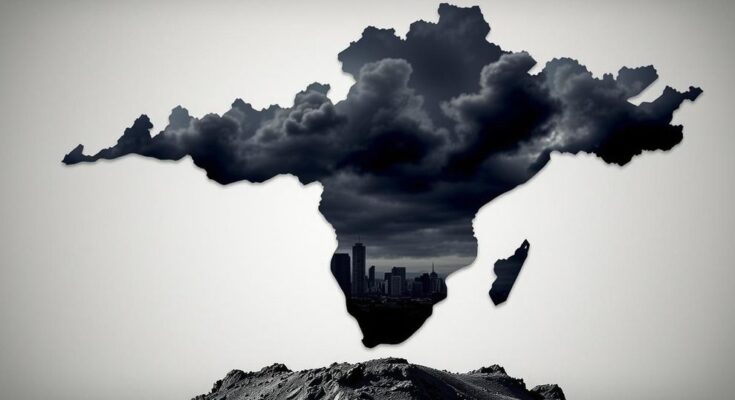The Democratic Republic of Congo cut diplomatic ties with Rwanda as M23 rebels threatened Goma, resulting in civilian displacement and casualties among peacekeepers. The DRC accuses Rwanda of supporting M23, while the latter maintains a military presence for security. The situation remains critical, prompting urgent attention from international bodies.
On January 25, 2025, the Democratic Republic of Congo (DRC) severed diplomatic relations with Rwanda amid escalating violence as M23 rebels advanced towards Goma, leading to widespread civilian displacement. Fighting has resulted in casualties among peacekeepers and soldiers, intensifying the humanitarian crisis. The M23 group, which primarily consists of ethnic Tutsis, has gained strategic territory, raising concerns about Goma’s imminent fall.
The DRC, along with the United States and United Nations experts, accuses Rwanda of supplying support to the M23 rebels. This group emerged over a decade ago from the Congolese army and currently operates in a region plagued by numerous armed factions. Rwanda denies these allegations but admits maintaining military presence in the DRC, claiming it is necessary for its own security amid the mobilization of Congolese forces.
In response to the unfolding situation, the DRC’s Foreign Ministry announced the immediate withdrawal of diplomatic personnel from Rwanda. Following this decision, the U.N. Security Council convened an emergency meeting to discuss the rising violence. Gunfire could be heard in Goma, with refugees fleeing to the city center as fears grow regarding the rebel offensive.
Recent advances by the M23 include capturing Sake, only 27 kilometers from Goma. Although the Congolese army, supported by U.N. forces and the Southern African Development Community Mission (SAMIDRC), repelled one M23 assault, significant casualties occurred among peacekeepers from multiple nations, including South Africa and Uruguay.
The United Nations peacekeeping force, MONUSCO, has been stationed in the DRC for over two decades, maintaining approximately 14,000 personnel as part of its commitment to stabilize the region. The continuation of violence necessitates urgent international attention to prevent further escalation and humanitarian catastrophe.
The conflict in the eastern Democratic Republic of Congo has its roots in a complex interplay of local ethnic tensions, historical grievances, and the struggle for control over rich mineral resources. The M23 rebel group has previously engaged in violent confrontations with the DRC government, leading to accusations against Rwanda for their alleged support of these rebels. The region has been marked by instability, with an assortment of armed groups vying for dominance, causing extensive displacement and humanitarian distress.
The severance of diplomatic ties between the DRC and Rwanda reflects the severity of the armed conflict surrounding Goma. As the M23 rebels advance, the humanitarian situation worsens, prompting immediate international attention. The DRC’s military efforts, supported by U.N. forces, strive to manage the escalating violence and protect civilians, highlighting the fragile security environment in this resource-rich but tumultuous region.
Original Source: apnews.com




